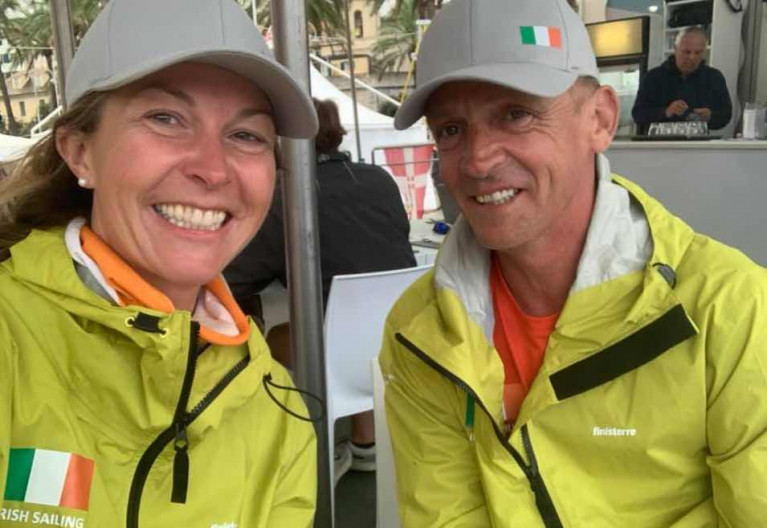Displaying items by tag: L30
French Claim European Mixed Offshore Title as Ireland's Fogerty & Glenny Make L30 Debut
France has claimed the inaugural European Mixed Offshore Title in Italy in which Ireland's Conor Fogerty and Susan Glenny made their debut in the L30 keelboat but unfortunately did not finish the one race event.
Fogerty says he is still 'licking his wounds' after the top-level event, claiming that 'only three hours sail time on the boat before the main event wasn't ideal'.
"We had issues onboard which augmented under pressure. I would have at least expected a fifth or sixth, but we were set on finding big holes in a light breeze", the Howth sailor related to Afloat.
 Conor Fogerty and Susan Glenny - the Irish pair say it was an amazing learning experience in a brand new boat and on a colourful race track that presented all of the favourite wind shut downs, complex currents and Mediterranean thermal affects
Conor Fogerty and Susan Glenny - the Irish pair say it was an amazing learning experience in a brand new boat and on a colourful race track that presented all of the favourite wind shut downs, complex currents and Mediterranean thermal affects
In the end, the race was a close and long duel between French team Benjamin Schwartz and Marie Riou against Íker Martínez & Natalia Via-Dufresne (ESP) with the French finally on top. "It was a hard and complicated race where we made some risky choices that turned out to be some bad ones and some good ones", so the first feedback of Benjamin Schwartz. The French took the lead from the Spanish team during the last night with a risky decision to sail away from the leading boat and the rest of the fleet. "In the morning we found ourselves at the top of the fleet from where we controlled the race for the last few miles back to Genoa“, explained Marie Riou.
Surprisingly, it wasn’t the Spanish team to cross the finishing line on second place after leading for many many hours. It was up to the Belgians Jonas Gerckens and Sophie Faguet to claim silver around 80 minutes after the French gold medalists. Third and with a slight bitter taste in their mouths, the Spanish Martínez/Via-Dufresne cut the line at 10:52 a.m., returning from a remarkable performance as they maintained the lead of the race until just a few hours before the finish and dictated the pace to the entire fleet for almost the entire course of the race. Just a few minutes after the Iberian crew, the national team Claudia Rossi and Matteo Mason finished a long race in pursuit of the first three. They tried and never gave up by sailing an excellent race, especially since they were making their debut on the L30.
 L30 Mixed Offshore European Entry List
L30 Mixed Offshore European Entry List
What's the L30 like offshore?
Fogerty says from his brief experience the L30 is an 'interesting concept, twin wheels, lifting rudders and keel, not to mention a possible configuration of Gennaker, J1, J3 and main all flying at the same time......'
 Fogerty & Glenny have expressed a hope to represent Ireland in the new mixed offshore keelboat class that will have its inaugural year as an Olympic class at the Paris 2024 Olympics
Fogerty & Glenny have expressed a hope to represent Ireland in the new mixed offshore keelboat class that will have its inaugural year as an Olympic class at the Paris 2024 Olympics
The former Ostar winner says he has some misgivings with the L30 as an offshore boat, "Any one design is going to be fun, and the L30 ticks that box, but Offshore? Shorthanded? It's too busy for a 30-ft and not set up for shorthanded racing, the twin wheel configuration cuts you off from the tools to trim your sails, even the autopilot is 10ft away on the coach roof. I also wouldn't be happy in a big breeze, due all those retractable underwater foils"
 The L30 - a fun boat
The L30 - a fun boat
He adds "It's a fun boat, lots of sail, but needs a crew and I think they should stay coastal and leave Offshore to tried and tested methods of offshore boats".
Just how strong the teams were at the event is shown by the fact that even the seventh team crossed the finish line within four hours of the winners; only one team didn’t finish.
- Team FRA 65h 46min 37sec
- Team BEL +1h 19min 19sec
- Team ESP +1h 31min 39sec
- Team ITA +1h 41min 47sec
- Team GER +2h 28min 31sec
- Team NED +2h 39min 36sec
- Team GBR +4h 09min 49sec
- Team IRL DNF
- Team MON DNS





























































